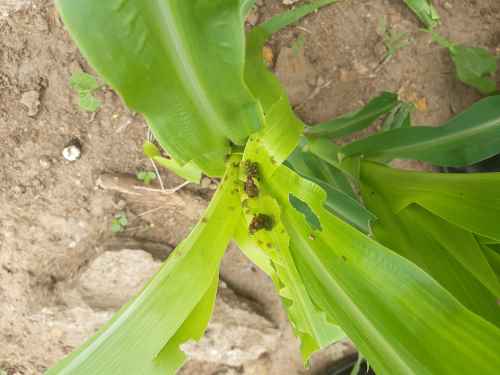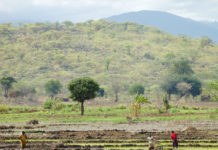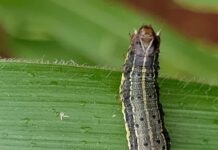The International Centre of Insect Physiology and Ecology (icipe) has developed a range of biopesticides, providing farmers in Africa with effective and environmentally safe alternatives for the management of the invasive and highly destructive fall armyworm.
Significantly, with the support of development partners, government and regulatory authorities, as well as private sector actors in East Africa, the Centre has undertaken label extension of two of its commercially available biopesticides, which are now being upscaled for fall armyworm control. In addition, a number of newly discovered biopesticides are undergoing fast-tracked registration.
Biopesticides are specific types of pesticides obtained from natural sources, like fungi, viruses, bacteria, nematodes and plants, as well as certain minerals. In comparison to their synthetic counterparts, biopesticides have numerous advantages: they do not leave toxic residue on produce; they pose minimal risk to the health of people and the environment; and they are less likely to induce pests and disease resistance. In addition, biopesticides are compatible with other integrated pest management (IPM) options.
The icipe biopesticides have been developed from the Centre’s extensive repository of insect infecting microorganism strains. A superior aspect of these products is that they are effective against different stages of the fall armyworm life cycle. For example, the biopesticides manage both the egg and early larval stages of the pest, preventing emergence of the destructive larval stage while also hampering population build-up.
Moreover, the Centre has established that the biopesticides can be used in combination with other fall armyworm management options like the push-pull technology, pheromone traps, attractants and the pest’s natural enemies. The biopesticides can also be autodisseminated; meaning that fall armyworms that pick-up the fungi can spread it to others.
“The progress made in the development and use of biopesticides is exciting for icipe and partners,” notes Dr Segenet Kelemu, Director General & CEO, icipe. “Since this notorious pest invaded Africa four years ago, our vision has been to provide farmers with science-led, context specific, affordable and environmentally friendly solutions for its management.”
She added: “At icipe, we are aware that our efforts have succeeded due to regional cooperation, as well as efficiency of regulatory bodies to harmonise and fast track biopesticide registration and commercialisation across East Africa.”
The fall armyworm challenge
The fall armyworm infests more than 100 plant species including maize, sorghum, rice and sugarcane, as well as a variety of horticultural crops. Until 2016, the pest was confined to its native origin, the Western Hemisphere (from the United States of America to Argentina). However, in January of that year, the fall armyworm was reported in Nigeria, and it has since spread at an alarming rate across Africa; its presence now confirmed in 47 African countries. The pest has also dispersed widely in Asia, and it was recently reported in Australia. In fact, part of the fall armyworm’s infamy is the ability to spread very fast – in its adult stage the pest can travel over 100 kilometres in a single night. It also has an amazing reproduction potential, as one female can lay up to 1,500 in its lifespan of only 30 days.
Control of the fall armyworm through conventional methods like the use of chemical insecticides, is complicated by the fact that the adult stage of the pest is most active at night, and the infestation is only detected after damage has been caused to the crop. Furthermore, the fall armyworm has a high tendency to develop resistance to most synthetic pesticides.
As such, the pest has significant implications for food and nutritional security, trade, household incomes and overall economies, as well as negative impacts on people and the environment in Africa. Moreover, this hazard piles onto, and escalates a range of existing agricultural challenges. For instance, many regions of the continent are already experiencing the impacts of climate change, including drier and hotter weather, stressed out soils, and increased outbreaks of indigenous and invasive pests.
Biopesticides – from lab to field
Against this
background, the development of the icipe
fall armyworm biopesticides has been guided by the need for rapid, yet rigorous
technology and product development, in compliance to safety and agricultural
trade regulations. This goal has depended on a participatory process involving
public and private sector partners, policy and regulatory authorities, research
institutions, and other stakeholders.
As a first step, icipe
tested the possible effectiveness of selected biopesticides that had been
commercialised for the control of diverse pests by the Centre in partnership
with Real IPM Ltd, a Kenya-based biocontrol company. Two of these, Mazao
Achieve® (ICIPE 78) and Mazao Tickoff® (ICIPE 7), were found to be effective
against immature stages of the fall armyworm. Therefore, Real IPM Ltd has
embarked on “label-extension”, to expand the use of these two biopesticides in
the management of fall armyworm in East Africa, and potentially across the
continent.
In addition, icipe
has identified other new and highly potent strains (ICIPE 41, ICIPE 655, ICIPE
20) that are effective against various life stages of the fall armyworm. Based
on scientific evidence, regulatory authorities in Kenya, Tanzania and Uganda
permitted the testing of the strains in the field. The trials have been conducted
in alignment to the harmonised regional guidelines of the East
African Community (EAC), and in partnership with regulatory agencies and
private sector partners.
“The fact that we have been able to fast-track promising products for the
control of a major menace, from the lab to the field, in a relatively short
time is testament to the importance of an enabling policy and regulatory
environment for release, registration and trade of agro-inputs,” said Mr David
Wafula, Agriculture Specialist, EAC.
He added: “Indeed, this achievement is in line with the vision of EAC partner
states; that of working together to address the challenges in agriculture, one
of the most important sectors in the region.”
“In Uganda, and across Africa, safe and efficacious bio-based innovative
solutions are urgently needed to help tackle the enormous challenges to food
and nutritional security of our people posed by the destructive and highly
invasive cryptic insects like the fall armyworm and locusts,” noted Dr Elioda
Tumwesigye (MP), Minister for Science, Technology and Innovation, Uganda. “We
are delighted to have been part of the journey towards the development of the icipe biopesticides,
which, in the long-term, sets scene for similar, goal-oriented collaborations
and networks.”
Prof. Hamadi Iddi Boga, Principal Secretary, State Department for Agricultural Research, in the Ministry of Agriculture, Livestock, Fisheries, Kenya, stressed: “This icipe-led process presents a great model for developing agricultural innovations. It demonstrates that partnerships founded on shared visions and values can help to circumvent challenges that often stifle such initiatives.”
icipe is working with value chain actors and stakeholders to enhance knowledge on effective handling of biopesticide products; train farmers on the advantages of using biopesticides; and strengthen compliance and enforcement activities of the regulators so that product quality is maintained.
References:
Akutse K. S., Kimemia J.W., Ekesi S., Khamis F.M., Ombura O.l. and Subramanian S. (2019) Ovicidal effects of entomopathogenic fungal isolates on the invasive fall armyworm Spodoptera frugiperda (Lepidoptera: Noctuidae). Journal of Applied Entomology 143, 626–634. https://doi.org/10.1111/jen.12634
Funding for the development of
the icipe biopesticides
has been obtained from the European Union through the “Integrated pest
management strategy to counter the threat of invasive Fall armyworm to food
security in Eastern Africa (FAW‐IPM)” project
(FOOD/2018/402‐634); the UK Department for International Development (DFID)
through a project titled “Developing, commercializing and scaling of
biopesticides for integrated Fall Armyworm (FAW) management to improve the
livelihoods of smallholder farmers”; and by BioInnovate Africa Programme
– supported by the Swedish International Development Cooperation Agency (Sida)
– through the “Promoting smallholder access to fungal biopesticides
through Public Private Partnerships in East Africa – PROSAFE” project. icipe gratefully
acknowledges the financial support of the following core donors: Swiss Agency
for Development and Cooperation (SDC); Swedish International Development
Cooperation Agency (Sida); UK Aid, from the government of the United Kingdom;
the Ministry of Higher Education, Science and Technology, Kenya; and the
Government of the Federal Democratic Republic of Ethiopia.
Collaborators
Kenya: Kenya
Agriculture and Livestock Research Organization (KALRO); Kenya Plant Health
Inspectorate Service (KEPHIS); Pest Control Product Board (PCPB); Ministry of
Agriculture; Real IPM Ltd and Kenya Biologics Ltd. HortiServe and Russell IPM.
Tanzania: Tanzania Agricultural Research Institute (TARI); Tropical Pesticide
Research Institute (TPRI); National Biological Control Programme (NBCC) and
National Plant Protection Advisory Committee (NPPAC).
Uganda: National Agricultural Research Organization (NARO); Agricultural
Chemicals Board; Department of Crop Inspection and Certification; Ministry of
Agriculture Animal Industry and Fisheries.
Ethiopia: Ethiopian Institute of Agricultural Research (EAIR); Ministry of
Agriculture; Plant Health Regulatory Directorate (PHRD).
East Africa Community (EAC) Secretariat
The International Centre of Insect Physiology and Ecology (www.icipe.org): Our mission is to help alleviate poverty,
ensure food security, and improve the overall health status of peoples of the
tropics, by developing and disseminating management tools and strategies for
harmful and useful arthropods, while preserving the natural resource base
through research and capacity building.









